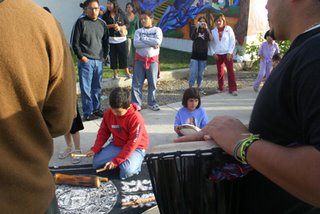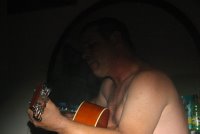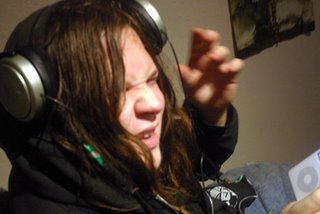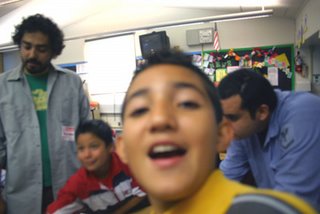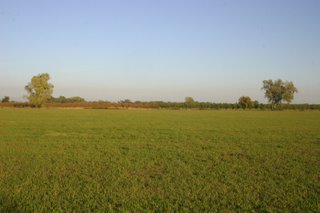We’ve returned to Gridley and found it utterly the same: conservative, contained, controlled. My brother and I went to the country vet to pick up our dog Moxie. Outside were two men in their late 30’s dressed in hunting gear—camouflage jackets, pants, hats, boots. At least one of them was also wearing a Butte County Sheriff’s uniform underneath. I saw his badge. The other was dressed similarly, though I didn’t see his badge.
They looked us over sheepishly as we got out of our car. Before we passed them they decided to go inside and wait. I might have seen a scowl across the sheriff’s face. Or maybe it was a scowl mixed with confusion. I guess people don’t know how to handle ambiguously ethnic looking people, especially ones with large beards and large uncombed heads of hair. I don't like to acknowledge that cops are looking me over, but they were.
Gridley hasn’t changed all that much in the years I've known it. The community shies away from its meth problem—despite all the drug busts in Butte County. In Gridley, there is one subdued outreach program, on the edge of its historic downtown.
The Mexican population is slowly taking over the town, but there are habits in town hard to overcome--the Mexicans don't celebrate enough, and when they do, there are plenty of cops to make sure "gangs" don't burst the seams of latent cultural tension.
The Highway 99 is both Gridley’s economic crutch and its major flaw. The 99 runs right through Gridley. Some would say the “middle” of Gridley, though it's a little more complex than that—it runs north-south on the eastern side of its historic downtown. Fast-food chains have become lasting investments because of it. For a long time Burger King was one of the only fast food places on the 99, along with a couple of locally owned businesses. Then a McDonald’s came--a momentous event, and then a Taco Bell and a Subway. More recently, right next door to McDonald's a Quizno’s has come up. Even more recently, a Starbucks has finally come to town, though unlike the Quizno’s owners, the proprietors were savvy enough to find a better location up the highway, nearer to the highschool, and almost encroaching on Gridley’s “downtown.”
Gridley’s downtown: El Toro Foods, Bremer’s, Sylvio's Pizza. There used to be a video store until Blockbuster came through (also along the Hwy 99) and put virtually every one of the seven (7!) video stores out of business. There a couple of bars, one of which is probably unwelcoming to people of certain shades of color. The Family T-Shirt Factory is also there, next to the police station. A couple of parks. Right in the middle of town, across the street from the police station, where the theater used to be, is a giant Church of the Nazarene.
East of the 99 the city limits approaches relatively quickly, as we approach that other side of Gridley. Between the train tracks and the Feather River lies an enclosure of public housing, once serving migrant workers, but now housing people with more permanent status. To natives, it's known as "el campo" and the "labor camp." "Segregation" might have a slew of heavy historical connotations, but this is what it is.
Gridley’s kids often work in agriculture of some sort. There isn’t much else around. Houses in town are large, opulent one might even say. They’re set back from the quiet roads with dutifully manicured lawns. But the larger, individual homes with unique designs are offset by the streets and streets of track housing. These houses are largely the same. People of all varieties live there though they often work in agriculture as well. There are a few other staple businesses of course--a glass company, cabinet makers, construction, mechanics.
Recently, jobs have become available as a result of the new housing developments that have gone up on the west side of Gridley—the type of semi-gated neighborhood with names like "Heavenly Meadows." Spacious, 2-story homes calculated to fit the needs of semi-affluent Northern-Northern Californians (or at least ones willing to go into large amounts of debt), they’re not that different from the flat 2-3 bedroom track homes a few blocks away, except that they're at least twice as big. Every house is basically identical. The residents may see the obvious similarities in their homes, but the streets are nice, all 4 cars fit in front, the rooms are spacious. Residents may however feel that they are twice as privileged as most people, perhaps with the exception of the old-timers with the older "classic" homes near downtown.
Did I mention that at the top of downtown, surveying it pasture, is a well-sized Church of Latter Day Saints?
Gridley: town of enormous churches, figuring itself out. Farmers struggling just as farmers struggle all over the world, though we wouldn’t know it (the Gridley Herald isn't exactly a bastion of investigative journalism). Mexicans, working for cheap, getting pulled over for driving without licenses, on their way home from building housing bubble homes.
Did I mention I love Gridley for some odd reason?














